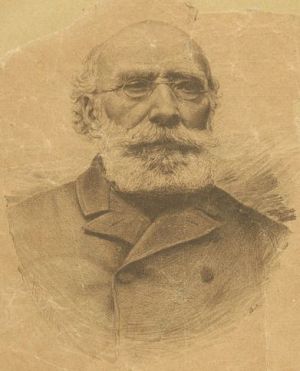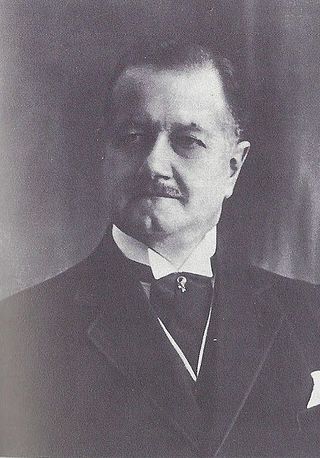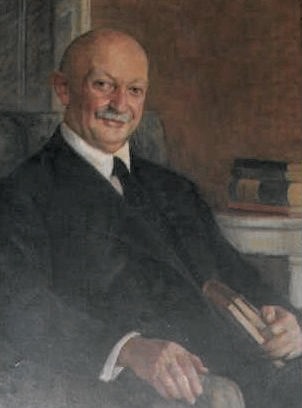Professor Patrice Mangin is a widely published forensic pathologist and toxicologist, director of the University Center of Legal Medicine in Lausanne and Geneva, Switzerland.
Mangin graduated from the Faculty of medicine Broussais-Hôtel-Dieu, University René Descartes in 1973. In 1978 he obtained his M.D. thesis at Faculty of medicine, Louis Pasteur University - Strasbourg I and later got his board certification in legal medicine in France and Switzerland in 1980 and 1996 respectively. He defended his Ph.D thesis in toxicology under Professor of Pharmacy G. Dirrheimer at Louis Pasteur University - Strasbourg I in 1985. He was an intern and resident in various French hospitals, including Department of Clinical Neurophysiology at Hôpitaux universitaires de Strasbourg where he served from 1973 to 1977 and from 1978 to 1980 respectively. [1]
Subsequently, Mangin was appointed as Attaché (Assistant in English) at the Institute of Legal and Social Medicine and then served on the Faculty of Medicine at the Louis Pasteur University as well as an Assistant Professor of Medicine at the same alma mater between 1981 and 1986. Following it, he became a Maître de conférences and medical practitioner at the Institute of Legal and Social Medicine, Faculty of medicine, University Louis Pasteur - Strasbourg I. [1]
In 1990, Patrice Mangin was appointed as University Professor and medical practitioner at the Institute of Legal and Social Medicine and from 1990 to 1996 served as its director. Since 1996, he holds a title of Ordinarius Professor of Legal Medicine and works as a director of the University of Lausanne in Switzerland. [1]
From 1999 to 2006 he was selected as Vice-Dean of the Faculty of Medicine, University of Lausanne and then served as a Dean of the Faculty of Biology and Medicine at the same place. [1]
Since 2007, he is a Director and Ordinarius Professor of Legal Medicine at the University Center of Legal Medicine in Lausanne-Geneva, Switzerland. Moreover, since August 1, 2011, Prof. Mangin took over the leadership of the Department of Community Medicine and Health (DUMSC) of the University Hospital of Lausanne (CHUV). [1]
Patrice Mangin is a member of a number of distinguished national and international professional societies, among of which are; the French Society of Legal Medicine, the International Academy of Legal Medicine of which he served as a treasurer from 2009 to 2012 and from 2012 to 2015 was its elected vice-president. He is also member of the American Academy of Forensic Sciences (AAFS), the International Society for Forensic Genetics, European Council of Legal Medicine of which he is a treasurer, and of The International Association of Forensic Toxicologists (TIAFT). He is member and former president of the Swiss Society of Legal Medicine. [1]
Furthermore, he is a member of several editorial boards: International Journal of Legal Medicine, The American Journal of Forensic Medicine and Pathology , Journal de Médecine Légale et de Droit Médical, Law, Probability and Risk, [1] Encyclopedia of Forensic Sciences, [2] the Romanian Journal of Legal Medicine [3] and Acta Medicinæ Legalis. [4]
Patrice Mangin headed an international pathology team that volunteered to examine the body of Salah Addin Ali Ahmed Al-Salami, a Yemeni detained in the United States Guantanamo Bay detainment camps, who died on June 10, 2006. [5] American authorities said Al Salami and two Saudi men committed suicide by hanging themselves. Mangin reassured family members that it was routine for the American medical team to have removed some organs that decay rapidly, such as the brain, heart and liver. But he said that the Americans had retained the organs of Ahmed's throat: the larynx, hyoid bone and thyroid gland, which he needed to examine to determine whether Al Salami died by hanging. [5]

Louis Pasteur was a French chemist and microbiologist renowned for his discoveries of the principles of vaccination, microbial fermentation, and pasteurization, the last of which was named after him. His research in chemistry led to remarkable breakthroughs in the understanding of the causes and preventions of diseases, which laid down the foundations of hygiene, public health and much of modern medicine. His works are credited with saving millions of lives through the developments of vaccines for rabies and anthrax. He is regarded as one of the founders of modern bacteriology and has been honored as the "father of bacteriology" and the "father of microbiology".

The University of Lausanne in Lausanne, Switzerland was founded in 1537 as a school of Protestant theology, before being made a university in 1890. The university is the second oldest in Switzerland, and one of the oldest universities in the world to be in continuous operation. As of fall 2017, about 15,000 students and 3,300 employees studied and worked at the university. Approximately 1,500 international students attend the university, which has a wide curriculum including exchange programs with other universities.

Charles Louis Alphonse Laveran was a French physician who won the Nobel Prize in Physiology or Medicine in 1907 for his discoveries of parasitic protozoans as causative agents of infectious diseases such as malaria and trypanosomiasis. Following his father, Louis Théodore Laveran, he took up military medicine as his profession. He obtained his medical degree from University of Strasbourg in 1867.

Louis Pasteur University, also known as Strasbourg I or ULP was a large university in Strasbourg, Alsace, France. As of 15 January 2007, there were 18,847 students enrolled at the university, including around 3,000 foreign students. Research and teaching at ULP concentrated on the natural sciences, technology and medicine. On 1 January 2009, Louis Pasteur University became part of the refounded University of Strasbourg and lost its status as an independent university.

Pierre Jacques Antoine Béchamp was a French scientist now best known for breakthroughs in applied organic chemistry and for a bitter rivalry with Louis Pasteur.

Medical jurisprudence or legal medicine is the branch of science and medicine involving the study and application of scientific and medical knowledge to legal problems, such as inquests, and in the field of law. As modern medicine is a legal creation, regulated by the state, and medicolegal cases involving death, rape, paternity, etc. require a medical practitioner to produce evidence and appear as an expert witness, these two fields have traditionally been interdependent.
Abbas Aroua is an Algerian medical and health physicist. He is also human rights defender, peace worker and political activist.

Alfred Swaine Taylor was an English toxicologist and medical writer, who has been called the "father of British forensic medicine". He was also an early experimenter in photography.

Hermann Friedrich Teichmeyer was a German physician and botanist born in Hannoversch Münden. He was father-in-law to Albrecht von Haller (1708–1777).

Denis Duboule is a Swiss-French biologist. He earned his PhD in Biology in 1984 and is currently Professor of Developmental Genetics and Genomics at the École polytechnique fédérale de Lausanne (EPFL) and at the Department of Genetics and Evolution of the University of Geneva. Since 2001, he is the Director of the Swiss National Research Center "Frontiers in Genetics" and since 2017, he is also a professor at the Collège de France. He has notably worked on Hox genes, a group of genes involved in the formation of the body plan and of the limbs.
The French École supérieure de biotechnologie Strasbourg, also called European School of Biotechnology, Strasbourg (ESBS) is a scientific college situated in Illkirch. It was founded in 1982 as an autonomous institute within the University of Strasbourg and offers an international biotechnology program.

The Lausanne University Hospital, in Lausanne, is one of the five university hospitals in Switzerland.
Ravindra Fernando is a Sri Lankan forensic pathologist, toxicologist, physician, author and academic. He is the current chairman of the National Dangerous Drugs Control Board of Sri Lanka.
Dr. Agop Handanyan was a respected physician, writer, translator, professor, and author of the first forensic science book in Ottoman Turkey. He was of Armenian descent.

Alain L. de Weck,, was a Swiss immunologist and allergist. His main scientific contributions were in the area of characterization and prevention of drug allergy. He was the founding director of the Institute of Clinical Immunology at the University of Bern from 1971 to 1993 and authored or co-authored over 600 peer-reviewed publications. He is the recipient of a number of patents that led to commercial allergy products and services. He served as president of international scientific organizations such as the International Union of Immunological Societies (IUIS) and the International Association for Allergy and Clinical Immunology (IAACI) and was founder and later CEO of the Centre Médical des Grand-Places (CMG) company, acquired by Heska of Fort Collins in 1997. In later years he continued his research at the University of Navarra in Spain and wrote on a wide range of topics such as the distinction between science and pseudo-science, the emergence of genetically modified organisms (GMOs) and comparative health care policy.
The Geneva University Hospitals is one of the five university hospitals of Switzerland and the largest one in the country. It is one of the largest hospitals in Europe.
Robert-Henri Regamey was a Swiss physician and microbiologist. He held the chair in microbiology at the University of Geneva Faculty of Medicine from 1959. He is particularly known for his work on immunobiological standardization, and he served as a member of an expert committee on biological standardization appointed by the World Health Organization and co-founded the International Association of Biological Standardization.

Placide Nicod was a Swiss orthopedic surgeon. He was considered to be the top French-speaking Swiss orthopedist of his time.
Albert Ernst Renold was a Swiss physician and clinical biochemist noted for his extensive research on diabetes. In 1986 he was awarded the King Faisal International Prize in Medicine for contributions to the understanding of diabetes.

Akil Muhtar Özden (1877–1949), was a Turkish physician known for being the pioneer of experimental pharmacology in Turkey. He was educated at the Medical School of Geneva, whereupon graduation worked at the Pasteur Institute in Paris and prepared a doctoral thesis on ‘‘Long Lasting Cerebrospinal Meningitis’. He carried out research on ‘chloralose’ and 'opium alkaloids’. In 1909, he was appointed to the Civil Medical School of Istanbul as a lecturer and embarked on a long career of medical teaching until his retirement in 1943. After his retirement, Özden continued working in the medical field and had a short stint as a senator in the parliament.